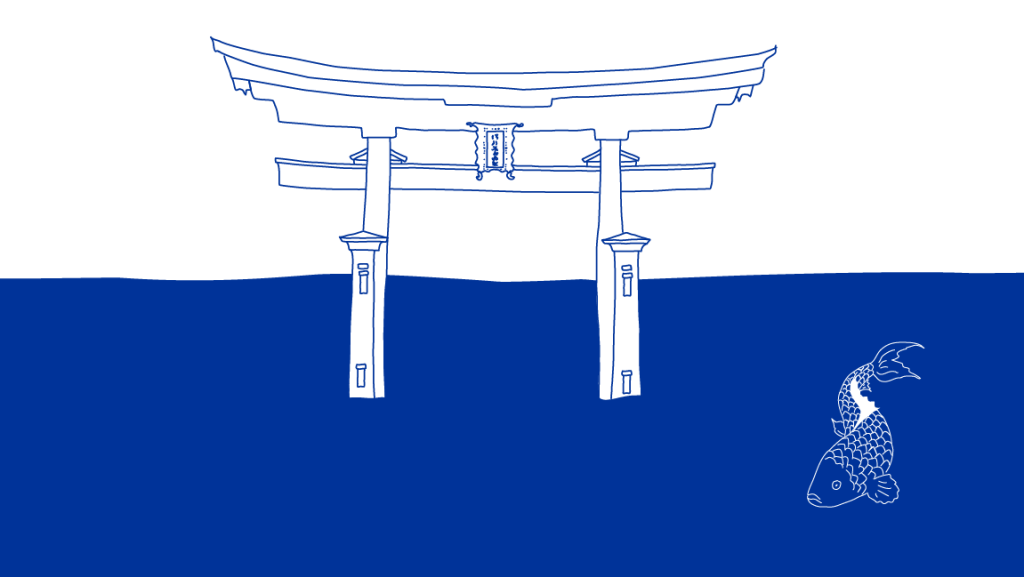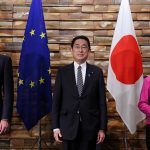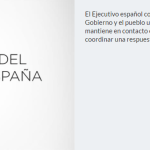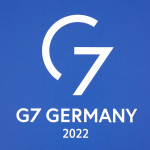G7 Hiroshima Leaders’ Communiqué
1. We, the Leaders of the Group of Seven (G7), met in Hiroshima for our annual Summit on May 19-21, 2023, more united than ever in our determination to meet the global challenges of this moment and set the course for a better future. Our work is rooted in respect for the Charter of the United Nations (UN) and international partnership.
We are taking concrete steps to:
- support Ukraine for as long as it takes in the face of Russia’s illegal war of aggression;
- strengthen disarmament and non-proliferation efforts, towards the ultimate goal of a world without nuclear weapons with undiminished security for all;
- coordinate our approach to economic resilience and economic security that is based on diversifying and deepening partnerships and de-risking, not de-coupling;
- drive the transition to clean energy economies of the future through cooperation within and beyond the G7;
- launch the Hiroshima Action Statement for Resilient Global Food Security with partner countries to address needs today and into the future; and
- deliver our goal of mobilizing up to $600 billion in financing for quality infrastructure through the Partnership for Global Infrastructure Investment (PGII)
as outlined in the reference documents of this Communique.
We are determined to work together and with others to:
- support a free and open Indo-Pacific and oppose any unilateral attempts to change the status quo by force or coercion;
- foster a strong and resilient global economic recovery, maintain financial stability, and promote jobs and sustainable growth;
- accelerate achievement of the Sustainable Development Goals (SDGs), recognizing that reducing poverty and tackling the climate and nature crisis go hand in hand;
- promote the evolution of the Multilateral Development Banks (MDBs);
- strengthen our partnerships with African countries and support greater African representation in multilateral fora;
- preserve the planet by accelerating the decarbonization of our energy sector and the deployment of renewables, end plastic pollution and protect the oceans;
- deepen cooperation through Just Energy Transition Partnerships (JETPs), the Climate Club and new Country Packages for Forest, Nature and Climate;
- invest in global health through vaccine manufacturing capacity worldwide, the Pandemic Fund, the future international agreement for pandemic prevention, preparedness and response, and efforts to achieve universal health coverage (UHC);
- cooperate on international migration and strengthen our common effort to fight the trafficking and smuggling of human beings; and
- advance international discussions on inclusive artificial intelligence (AI) governance and interoperability to achieve our common vision and goal of trustworthy AI, in line with our shared democratic values.
2. We will champion international principles and shared values by:
- upholding and reinforcing the free and open international order based on the rule of law, respecting the UN Charter to the benefit of countries, large and small;
- strongly opposing any unilateral attempts to change the peacefully established status of territories by force or coercion anywhere in the world and reaffirming that the acquisition of territory by force is prohibited;
- promoting universal human rights, gender equality and human dignity;
- reiterating the importance of multilateralism including the role of UN and international cooperation in promoting peace, stability and prosperity; and
- strengthening the rules-based multilateral trading system and keeping pace with the evolution of digital technologies.
3. We will work with our international partners to achieve a world that is human-centered, inclusive and resilient, leaving no one behind. In that spirit, we welcomed the participation of the Leaders of Australia, Brazil, Comoros, Cook Islands, India, Indonesia, Republic of Korea, and Vietnam.
Agenda highlights
The G7 summit hosted by this year’s Japanese G7 presidency takes place in Hiroshima City, Japan.
The EU will be represented by the President of the European Council, Charles Michel, and the President of the European Commission, Ursula von der Leyen.
The summit in Hiroshima is an opportunity for G7 leaders to demonstrate their strong determination to uphold the international order based on the rule of law, and to strengthen their outreach to the Global South.
The main issues to be addressed during the eight working sessions are:
- Russia’s aggression against Ukraine
- engagement with international partners
- nuclear disarmament and non-proliferation
- economic resilience and security
- climate, energy and environment
- food, health and development
The Japanese presidency has also invited leaders from Australia, Brazil, the Comoros, the Cook Islands, India, Indonesia, Republic of Korea and Vietnam to take part in several working sessions during the summit.
At the end of the summit, the leaders are expected to adopt a leaders’ communiqué.

Statement by the G7 Finance Ministers and Central Bank Governors following their meeting in Washington D.C. |
About the Japanese G7 presidency
At the summit, Japan would like to demonstrate G7’s strong determination to categorically reject military aggressions, any threats or uses of nuclear weapons, as well as attempts to overthrow the international order.
The international community is now at a historic turning point, having experienced the COVID-19 pandemic and being faced with Russia’s aggression against Ukraine, which has shaken the very foundation of the international order
Japan Prime Minister Fumio Kishida
The year of the G7 presidency also serves as an opportunity to turn the attention of younger generations to global issues and encourage them to take action.
The EU as G7 member
The EU has gradually been included in all political discussions on the summit agenda and, since the Ottawa summit (1981), has taken part in all summit working sessions.
The EU has all the responsibilities of membership. The summit communiqué is politically binding on all G7 members.
The rotation of the presidency is as follows: Canada in 2018, France in 2019, the USA in 2020, the United Kingdom in 2021, Germany in 2022, Japan in 2023, and Italy in 2024.
More information: European Council







Leave a Reply